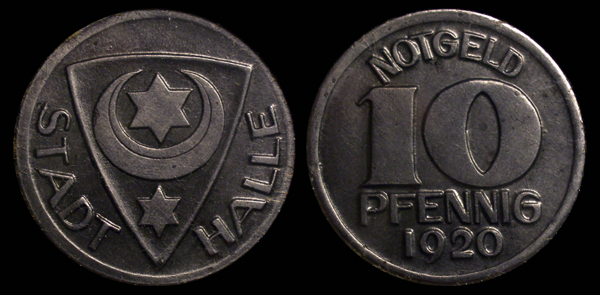
STADT HALLE (GERMAN) 10 PFENNIG 1920
L- 180.1 City of Halle (German) 10 Pfennig Coin Depicting the Coat of Arms of the City.
This iron coin is Notgeld (emergency money) issued by the City of Halle. Situated on the river Saale, Halle is the largest city in the southern part of the German State of Saxony-Anhalt. The presence of rich brine springs in the area led to the extraction of salt as early as the late Bronze Age and gave birth to a long standing salt industry in the area for centuries to come. An ancient settlement, the first mention of Halle in historical manuscripts appear as early as 806. In 1680 Halle became part of the Electorate of Brandenburg and the Kingdom of Prussia from 1701.
After a brief occupation by French troops in 1806, Halle became a part of the Kingdom of Westfalia with a high degree of autonomy. By 1900 the population of the city had risen to 150,000. It had become an important stop on the early railroad network allowing the city to become an part of a rapidly growing industrial sector. After WWII and the partition of Germany, Halle became part of the German Democratic Republic (East Germany). It was designated capital of Saxony - Anhalt until the state was abolished in 1952 and it was then designated the administrative capital of district of Halle. In 1990 East Germany and West Germany Unified to become the Federal Republic of Germany and Saxony-Anhalt again became a state, this time with the city of Magdeburg as its capital and Halle as its largest city.
The composer Georg Friedrich Handel was a native of the city and is now its most honored citizen. He attended the newly founded University of Halle (now called Martin-Luther-Universitšt Halle - Wittenberg) until 1705 when he moved to Hamburg. Halle is also home to several art museums and festivals including the Galerie Moritzburg, the Museum of Prehistory, and the Handel House museum as well as the popular Handel Festival. Traditional salt mining ended in 1964 and a museum dedicated to the workers of the brine wells was opened the next year. Today Halle prides itself as being an industrial, cultural, artistic, and intellectual hub of the region.
